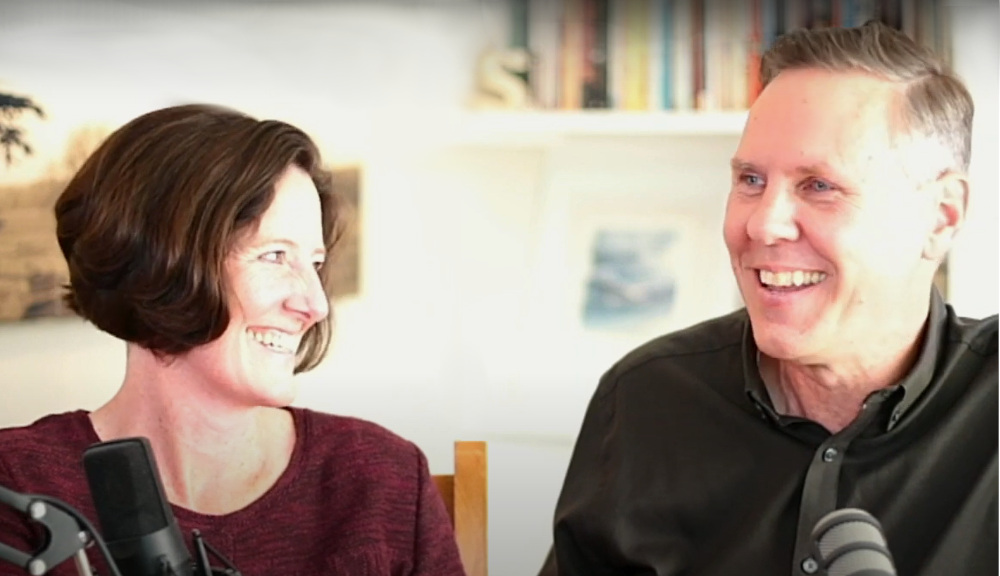Living Free Through the Prayer of Examen. A Conversation with Amy Boucher Pye
What a delight to bring you this conversation with my good friend Amy Boucher Pye. Amy is a retreat leader, spiritual director and author of several books, including the new 7 Ways to Pray. As the title suggests, this latest book explores seven time-tested tools for encountering God—everything from listening prayer to lament to imaginatively praying scripture—with Amy offering the story behind each practice and creative, accessible ways to experiment with them.
Amy asked a few of her friends to try some of the practices out, suggesting the Prayer of Examen for me. Crafted by Ignatius of Loyola in the sixteenth century, the examen is a five-step practice that helps you keep close to God by keeping a light conscience. In the conversation below, Amy and I discuss how my experiment went, how I grew, what I struggled with and what I found most beneficial. As you’ll hear, it was a richly rewarding experience.
7 Ways to Pray is the culmination of Amy’s years of study and practice and is a truly excellent resource. You can get it at your local bookstore, Amazon US, Amazon UK, Book Depository and Koorong. There’s a brilliant (and free) leader’s guide too.
I hope this helps you grow and live more freely too.
Watch Now
The Five Steps
Taken from chapter 7 of 7 Ways to Pray
1. Give thanks
To Ignatius, ingratitude was the root of all sin. When writing to a friend, he remarked that when we aren’t grateful, we don’t recognize the good things God gives us, which leads us away from God and into sinful behavior. In contrast, giving thanks for God’s gifts engenders a sense of wonder over his creation and helps us find God in all things, an emphasis for which Ignatius is known. We therefore start the examen prayer by offering thanks to God. We seek to feel gratitude with our whole selves, knowing that giving thanks helps us birth more desire for God.
2. Ask for grace
… to know our sins and reject them. Ignatius recognized the importance of petition; that is, of asking God for help to develop and be changed. Seeking God’s grace reflects a partnership of love whereby God our Creator lovingly reveals our defects. This conversation between Lover and beloved doesn’t morph into a dour and introspective time of beating ourselves up over our sins. Instead, we understand God as our loving Parent and not as a divine taskmaster or an uninterested deity. Even when we receive God’s correction, we sense his boundless love for us. We thus can experience the consolations Ignatius spoke of because we know that God helps us understand our failings so that we’ll love him more, become more truly ourselves, and serve others better.
3. Give an account
… of our thoughts, words, and deeds. This step involves moving through the day’s actions and thoughts. We focus on the movement of our souls—how we reacted in various situations. For instance, when did we feel fear, boredom, joy, anger, peace, disgust, contentment? How did we move toward or away from God? Ignatius understood that the Holy Spirit brings to mind specific thoughts, responses, and reactions and helps us ponder these questions and gain in discernment.
4. Seek forgiveness
Ignatius recognized that to experience freedom, people need forgiveness. He saw sin as “disordered attachments”— where our dreams, longings, hungers, and desires keep us from following God. When we name our individual sins and any unhealthy dependencies that come to light in the third step, we then ask God to forgive us. In directing us to be aware of our sins, Ignatius sought to awaken us to their cost—namely, that Christ died for them. With this awareness, we can experience a deepening love for God and our neighbor. When we know that God truly accepts us—that he forgives us fully—we accept others as they are, forgiving their wrongdoing against us.
5. Resolve to amend
… with God’s grace. In the fifth step, we collaborate with God further, looking back over the day just finished to discern our steps for the day to come. As with all of the examen’s points, we converse with God, talking with him about the hours that have passed and how we reacted during that time as we anticipate moving forward into the next day. Through this conversation we can uncover God’s loving surprises that will release our creativity and spur us on to growth and change.
Try it Yourself
Set aside just fifteen minutes to pray the examen. If you keep the time short and concise, you’re more likely to pray this way. You might want to write out your prayers or speak them to God.
Give thanks. Turn your heart to God in thanks, naming specific things for which you’re grateful.
Ask. Invite God to dwell with you through the Spirit and Son as you seek his strength, wisdom, and insight.
Review. Consider your words, thoughts, and actions and why you responded as you did. Where and when did you move toward God, and why? Away from him?
Repent. Ask God to forgive you for the ways you failed, and receive a clean slate through his love and grace.
Renew. While conversing with God, look forward to tomorrow, making plans for how you want to live as a child of God.







Michelle Vergara
Your conversation and the guided practice of Examen was so helpful to me. I have practiced a paraphrased version with less intentional Review and Renew steps. The hands-on learning through your guidance made all the steps come to life for me. I realized that my heart and actions can be insincere, though my intentions start out good. Because I currently don’t have many friends or mentors in God’s family locally who I trust (another painful though not new revelation), I’m especially grateful I have mentors in the two of you and a few others I’ve connected with through Our Daily Bread ministries. Please know a gal in Southern California appreciates you with all of her heart!
Sheridan Voysey
What a privilege to play a small role in this season for you, Michelle. Praying today that those local connections will be re-tied with trustworthy people. You’re always an encouragement, so thank you for what you give back to others!